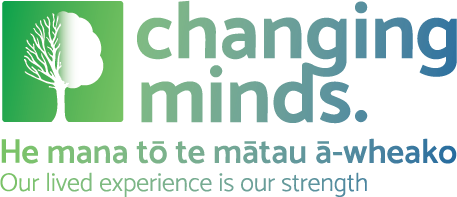Changing Minds response to ‘Every Life Matters’
In responding to the Government’s release of Every Life Matters | He Tapu te Oranga o ia tangata, Changing Minds is pleased to see the announcement from Government last week around suicide prevention, particularly:
an increase in post-discharge support
tailored Māori and Pacific suicide prevention initiatives
targeted mental health support in our emergency departments
expanding the information and resources available to family and whānau and free counselling for people bereaved by suicide.
CEO Taimi Allan says, “Last year, to support He Ara Oranga, Changing Minds proposed five enablers that would ensure the people most affected by suicide and suicidal behaviours would be at the centre of transformation.”
Those enablers are:
Support strong, well-connected leadership
Build a coordinated public health approach
Focus on protective factors and building wellbeing
Address inequalities, target responses to where needs are greatest
Include mechanisms to continually learn
They were developed by Changing Minds as distilled themes which emerged from continuous engagement with the communities the organisation serves.
Changing Minds sought feedback predominantly from those with lived experience of being affected by suicide (either personally as survivors), or bereaved whānau, but also engaged with the mental health and addiction sector, gathered data from mortality reviews, and submissions from communities as part of the Speaking the Unspeakable event as well as the submission to the government inquiry, He Ara Oranga.
“It is important to remember that suicide is not a “health” problem,” Taimi says. “It is a combination of complex and interlinking factors in a person’s life that make them feel lost, disconnected and in pain.
“The journey to suicidal thinking or behaviour is different for each person, but the end result is the same: the intense overwhelm [whether built up over a period of time and a culmination of events, or spontaneous decision based on a single event] makes people falsely believe that they, or the people around them would be better off if they were gone.”
Changing Minds’ approach to the priorities take into account that 50 percent of New Zealand’s suicides have no contact with mental health services and many do not even have contact with their GP – but nearly all of them had a community, whānau, friends, supporters or workplaces that cared about them.
People with lived experience of surviving suicide have told Changing Minds that the protective factors – the things that kept them alive and helped them to build a life worth living – are multi-layered and need to address the underlying social and socio-economic reasons for their distress (which include discrimination, relationships, disconnection, isolation, colonisation and inequality).
Changing Minds believes it is important to remember to focus funding on supporting the things that help make people’s lives easier, such as putting food on the table, providing meaningful employment, connecting people to their culture, helping people to thrive after trauma and develop strong and trusting relationships.
“The solutions don’t lie within the domain of health, but within the community – which is both the first place people access support and where you find the first responders to distress,” Tami says. “Our communities want to help, they are crying out for support and direction from a strong well connected and data-driven leadership with a solid evidence base of the things that work, and are safe.
“So we are buoyed by the announcement that a big chunk of the new wellbeing budget will go to new providers and collaborations in the community, as well as growing access and a choice of supports in new primary health settings.
“We need to collect evidence from all that goes on in communities in the prevention space, both overt and unintentional and then learn from these mechanisms to build on strategy.”
Changing Minds believes preventing suicide is EVERYBODY’S business – the key is a coordinated approach across public health, across political parties, across government ministries, iwi, community and across industries.
Read: Every Life Matters | He Tapu te Oranga o ia tangata
(The Suicide Prevention Strategy 2019–2029 and Suicide Prevention Action Plan 2019–2024 for Aotearoa New Zealand)

